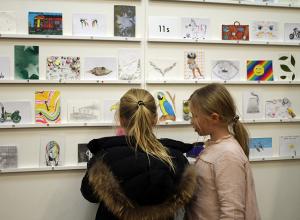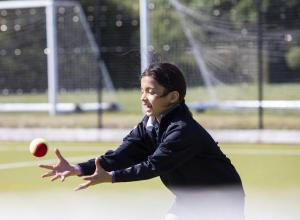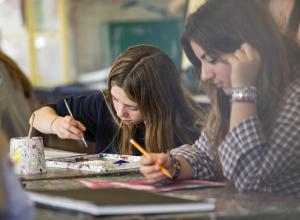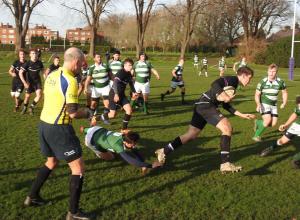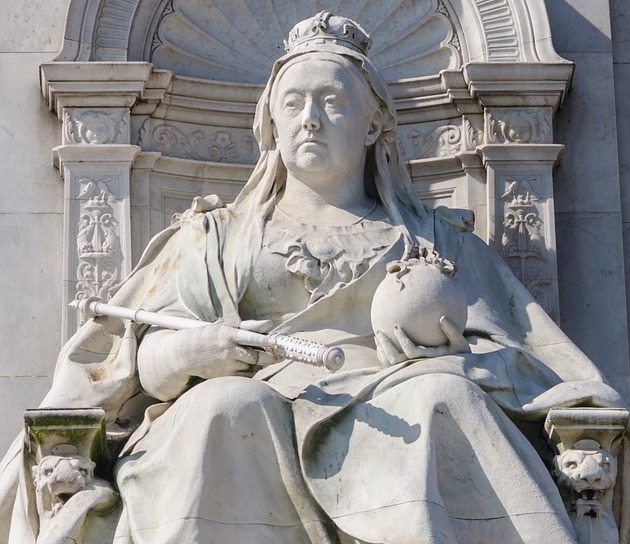
Unfashionable as Victorian morality may be, Andy Woodward wonders if the era's educationalists do still have something to teach us about building character.
Last Friday, my 8-year-old son attended his school wearing a jaunty cloth cap, a waistcoat, a neckerchief that in fact suggested misplaced cowboy aspirations and, inevitably, a tell-tale scribble of soot on each cheek. Yes – it was Victorian Day! A time when teachers bring great amusement to their classes by pretending they might beat them with a cane, and by telling them they should, at all times, be ‘seen and not heard’ (some chance!). Everyone involved had great fun, but ultimately returned to tell their parents, with feeling, that ‘I’m glad we’re not in Victorian times now!’.
I must confess to retaining a soft spot for aspects of that golden age of moustaches.
Andy Woodward, Head of Senior School
Even so, theme days are not the only way in which Victoriana continues to make its presence known in schools. Our national exam system – scribble as much information as possible at a tiny desk in a silent exam hall before time runs out – surely has far more to do with 19th Century ideas than it does the modern world of work. And every teacher knows the old politicised debate between the value of 19th Century didactic methods (teacher talk) and the new pedagogy (pupil-centred learning). The answer, for what it’s worth, is almost certainly “a bit of both”.
As for me, I must confess to retaining a soft spot for aspects of that golden age of moustaches. Don’t judge me too harshly. It’s just that, shaken free of the deeply unfortunate corporal punishment, child labour and horrific racial theory of the time, there are perhaps a few aspects worth preserving and learning from. I’m clearly not alone in thinking so. Over and again we recycle the great Victorian boarding school morality tales of Tom Brown’s School Days (printed in 1857 and retold ever since via Mr Chips, St Trinians, and, for sure, Harry Potter), while our media idealises a time when children faithfully learned the ‘three Rs’, and our leaders continue to behave, despite all evidence to the contrary, as if Britain really does still ‘rule the waves’. Most recently, a study by the Medical Research Council at the University of Cambridge even put forward an argument for the merits of emotional repression[1] - essentially the ‘stiff upper lip’.
Personally speaking, I have found that unfashionable 19th Century instructive literature, read selectively, is a secret treasure trove of assembly maxims.
But there are genuinely good things in there too (and I don’t just mean Harry Potter). After all, many have noted the negative side effects that accompany our more progressive, child-centred age. While it’s great that modern generations feel more heard, seen and validated – more in touch with their emotions, identity and with bountiful choices before them – there is certainly a question as to whether they are then becoming hardy enough, and independent enough, to take on the ever more challenging world before them. As that concern has grown, we have seen a conscious switch, in schools and more widely, towards promoting values that underpin character.
In 2016, astronaut Tim Peake sent a tweet from space reading ‘Character is important – a CV may get you the interview, but character will get you the job.’ At the same time, the Department for Education was launching a ‘character symposium’ and offering funds towards a Character Education Grant, all of which would have been heartily approved of by various Victorian educators who, to quote one writer, believed ‘character could represent a personal disposition founded upon restraining impulsive behaviour and cultivating habits that demonstrated willpower and a preparedness for an uncertain future’. Chief among these ‘habits’ were Resilience and Independence, both now found within our own six Harrodian School Pillars, alongside key contemporary values such as Inclusivity, which was never the Victorians’ strong point...
I would love our pupils to still feel they can achieve things beyond their expectations, and to keep going when things are hard or uncomfortable.
Personally speaking, I have found that unfashionable 19th Century instructive literature, read selectively, is a secret treasure trove of assembly maxims. It helps me understand how people back then really did seem to achieve the impossible, so that David Livingstone could be one of seven children born to a family living in a Scottish tenement building and working 14-hour days in a cotton mill at the age of 10… yet still managed to teach himself Latin, qualify as a medical doctor and become one of the world’s most famous explorers. My favourite of these tomes is Samuel Smiles’ rather humourless 1859 self-improvement manual ‘Self Help’. In here we hear that ‘great results cannot be achieved at once; and we must be satisfied to advance in life as we walk, step by step.’ Or, even better, that ‘in life, nothing can be more cheering and beautiful than to see a man combating suffering by patience, triumphing in his integrity, and who, when his feet are bleeding and his limbs failing him, still walks upon his courage.’ Wowsers.
This stuff, I would venture, is rather inspiring… even as I acknowledge you have to sift through plenty of (by modern standards) nonsense to get there. To be clear, I am very glad that we live in a time when our pupils are encouraged to talk and feel and emote. But I would love them too to still feel they can achieve things beyond their expectations, and to keep going when things are hard or uncomfortable. Indeed, more hard and uncomfortable times may lie ahead for us all. I also hope that, at a time when anyone, current or historical, who fails to meet today’s liberal ethical standards is in danger of being cancelled altogether, we can still keep hold of what is good and helpful in our national stories, while cheerfully ditching what deserves to be left behind. In truth, any of us, in any era, are fated to be regrettable in our worst moments and commendable in our best.
I hope that we can still keep hold of what is good and helpful in our national stories, while cheerfully ditching what deserves to be left behind
I will give the final timeless word to the father of young Tom Brown, as he headed off for his famous Victorian school days. I would still be happy to say them to my own son. ‘You tell the truth, keep a brave and kind heart, and never say anything you wouldn't have your mother and sister hear, and you'll never feel ashamed to come home, or we to see you.’

Mr Woodward is Head of Harrodian Senior School. He welcomes feedback on his blog to: website@harrodian.com

